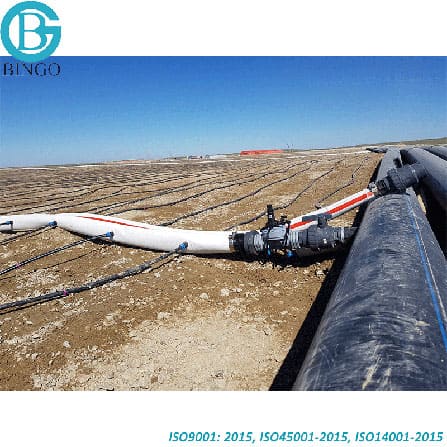Comprehensive Walkthrough to Installing hdpe pipe fittings Midland TX for Long-Term Durability
Comprehending the Key Conveniences of HDPE Pipe for Water and Wastewater Administration
The use of HDPE pipeline in water and wastewater administration presents numerous advantages that warrant factor to consider. Its extraordinary resilience and long life expectancy make it a preferred selection for several jobs. Furthermore, the product's resistance to corrosion and chemical damage improves its reliability in numerous environments. Nonetheless, the advantages extend beyond just longevity and resistance. Exploring its cost-effectiveness and environmental influence exposes also more compelling factors for its extensive fostering in contemporary framework
Exceptional Sturdiness and Durability

HDPE pipe attracts attention for its outstanding toughness and longevity, making it a favored choice in water monitoring systems. Constructed from high-density polyethylene, these pipes can withstand significant stress and anxiety, making certain reliable performance in time. Their robust nature allows them to sustain severe ecological conditions, consisting of temperature changes and soil activities, which can trigger various other products to fail.
The life-span of HDPE pipelines usually goes beyond half a century, supplying a cost-efficient solution for municipalities and sectors alike. In addition, the product's lightweight buildings simplify setup, decreasing labor expenses and durations. This toughness minimizes the need for regular repair work or replacements, further enhancing its economic allure.
In water monitoring applications, the dependability of HDPE pipelines implies fewer interruptions and improved solution connection, making them important to sustainable facilities growth. The mix of longevity and long life strengthens HDPE's function as a keystone in effective water monitoring solutions.

Resistance to Corrosion and Chemical Damages
While many materials catch deterioration and chemical damage over time, HDPE pipes show exceptional resistance, making them ideal for numerous water monitoring applications. This resilience originates from the molecular structure of high-density polyethylene, which is naturally non-reactive and does not rust like metals or degrade from exposure to severe chemicals. Consequently, HDPE is extremely efficient in atmospheres with aggressive materials, such as wastewater systems that may include acids, bases, and organic solvents.
Furthermore, HDPE pipes can stand up to ecological elements such as soil level of acidity and saline conditions, additionally improving their viability for diverse applications (Pipe Supplier American Plastics Midland). Their capability to preserve structural honesty in time decreases the danger of leakages and failings, which is essential in ensuring the security and dependability of water distribution and wastewater management systems. As a result, the resistance to corrosion and chemical damage noticeably adds to the overall effectiveness and durability of HDPE piping services
Cost-Effectiveness and Financial Advantages
When taking into consideration the economic ramifications of water management systems, the cost-effectiveness of HDPE pipes comes to be noticeable. These pipelines use lower installment and upkeep costs contrasted to traditional materials like steel or concrete. Their lightweight nature simplifies transportation and setup, resulting in decreased labor expenses. Additionally, HDPE pipes display a long lifespan, frequently going beyond 50 years, which equates click now to less substitutes and lasting cost savings.
The resistance of HDPE to deterioration and chemical damage lessens the demand for pricey fixings and replacements. The pipes also support effective water circulation, decreasing energy costs related to pumping systems. By reducing leakages and water loss, HDPE pipelines contribute to considerable financial benefits for towns and industries alike. On the whole, the first investment in HDPE piping can yield considerable economic returns over the lifespan of the water management system, making it a prudent choice for sustainable facilities development.
Ecological Sustainability and Lowered Impact

Versatility and Flexibility in Setup
Since of their distinct buildings, HDPE pipelines offer navigate here amazing versatility and flexibility in installment, making them suitable for a wide variety of applications. Their lightweight nature permits less complicated handling and transportation, reducing labor costs and installment time. HDPE pipelines can be curved and formed to fit numerous surfaces and project needs, which is specifically valuable in challenging atmospheres.
Furthermore, their resistance to deterioration and chemical damages enables setup in diverse settings without the demand for specialized protective finishings. The capability to fuse joints produces a constant, leak-free system, improving the total integrity and reliability of the installment. HDPE's adaptability likewise suits ground movement, decreasing the threat of damage in locations susceptible to changing dirt. On the whole, these features make HDPE pipelines not only versatile however also a preferred choice for water and wastewater monitoring systems.
Regularly Asked Concerns
Just How Does HDPE Pipeline Compare to PVC in Water Management Applications?
HDPE pipeline uses remarkable versatility, resistance to corrosion, and longevity compared to PVC. Its lighter weight helps with easier setup, while its long lifespan lowers substitute costs, making HDPE a favored selection in water monitoring applications.
What Is the Life-span of HDPE Pipeline Under Normal Problems?
Under regular problems, HDPE pipes can have a life expectancy ranging from 50 to 100 years. Their sturdiness and see it here resistance to rust contribute to their lasting performance in numerous applications, making them a dependable choice for facilities.
Are HDPE Pipes Recyclable After Their Solution Life?
Yes, HDPE pipes are recyclable after their service life. Texas hdpe pipe manufacturer. They can be refined and repurposed into brand-new items, significantly decreasing ecological influence and advertising sustainability within the industry, making them an environmentally friendly selection for piping options
What Is the Installment Refine for HDPE Pipeline?
The setup process for HDPE pipes entails site prep work, trenching, pipe fusion or mechanical signing up with, backfilling, and pressure screening. Proper techniques assure a sturdy and reliable system for delivering water and wastewater efficiently.
Can HDPE Piping Be Used for Both Safe And Clean and Non-Potable Water Solutions?
Yes, HDPE pipelines can be utilized for both safe and clean and non-potable water systems. Their adaptability, toughness, and resistance to deterioration make them appropriate for different applications, guaranteeing risk-free and reliable transport of water in different contexts.